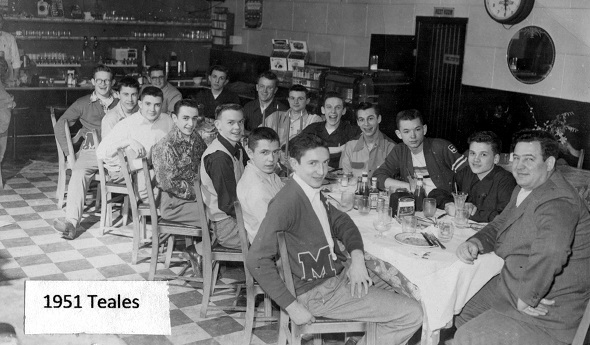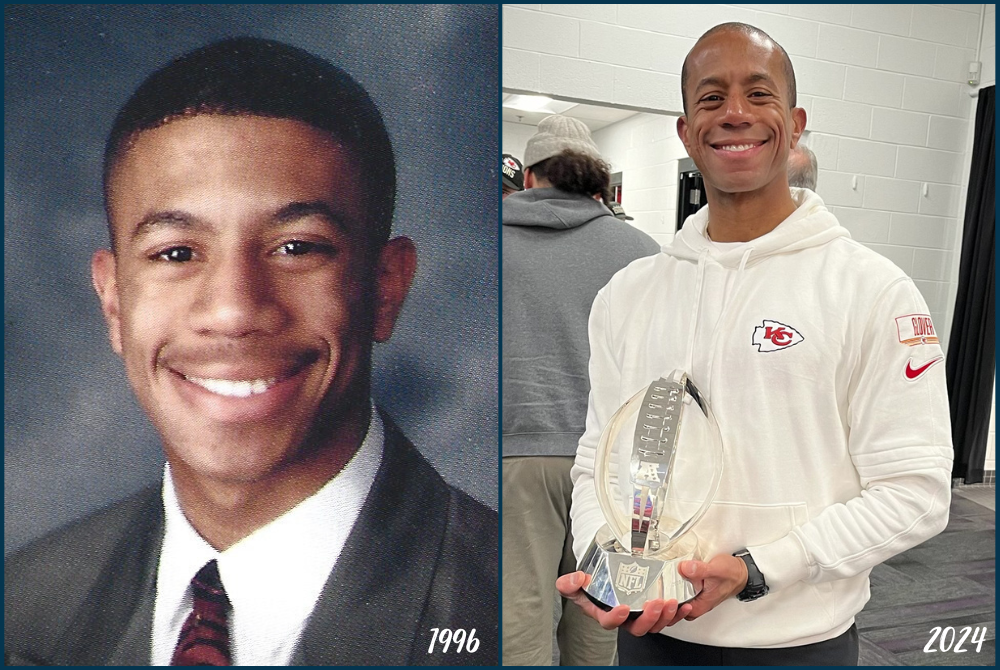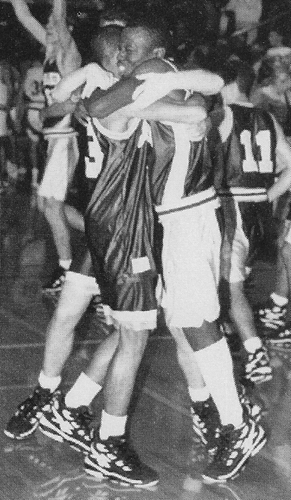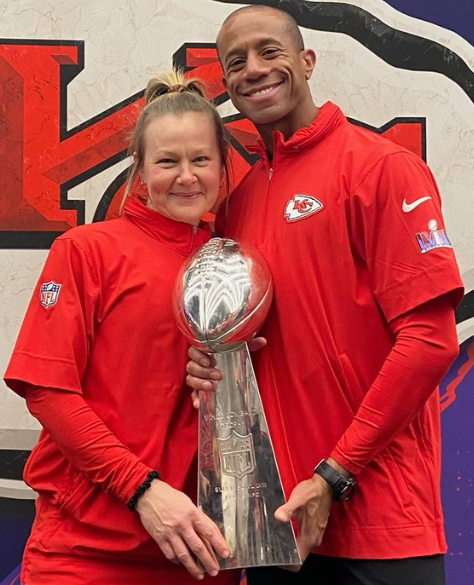
Data Dig Continues for Hoops Histories
March 7, 2017
By Ron Pesch
Special for Second Half
There is a list – well actually two – that sit, unfinished, among the “1,001 Projects I’d Like to Complete Before I Die.”
I became the caretaker of these lists back when I inherited the title “Historian for the MHSAA” in 1993.
The original lists contained the scores of all MHSAA Quarterfinal, Semifinal and Final round games for the MHSAA boys and girls basketball tournaments since their origin.
From the 1930s into the late 1960s, the MHSAA tournament game-day program was generally nothing more than a single sheet document, containing tournament brackets and team rosters for the qualifiers.
 In 1969, the program saw a redesign by Lansing sports personality Tim Staudt and premiered at the MHSAA Tournament. Sold for 50 cents, it included a list of “Past Michigan State Champions” containing the names of the winning teams and those schools’ basketball coaches for each of the four classes. The publication also included a couple of articles from Dick Kishpaugh, the author of the champions list. Kishpaugh was identified as “Sports Information Director at Kalamazoo College and … perhaps the most knowledgeable historian on Michigan high school basketball.”
In 1969, the program saw a redesign by Lansing sports personality Tim Staudt and premiered at the MHSAA Tournament. Sold for 50 cents, it included a list of “Past Michigan State Champions” containing the names of the winning teams and those schools’ basketball coaches for each of the four classes. The publication also included a couple of articles from Dick Kishpaugh, the author of the champions list. Kishpaugh was identified as “Sports Information Director at Kalamazoo College and … perhaps the most knowledgeable historian on Michigan high school basketball.”
With the start of the Girls Basketball Tournament in 1973, a similar program design was followed.
Those lists were faithfully updated and published in the game-day programs in the same format until the 1987-88 school year, when the souvenir publications were expanded. For the first time, a list containing opponents and final scores of the boys and girls championship games was now available to the general public.
Among the first tasks I chose to approach when I assumed the duties of MHSAA historian was to chase more information.
Since Kishpaugh’s lists had game scores for the three final rounds of the tournament, and names of the championship coaches, I thought I would try to leave my mark. I began chasing down the names of coaches for the runner-up, as well as final win-loss records for both schools. And while I was at it, I decided to see what I could find for teams that made the Quarterfinals and Semifinals.
Hundreds of hours have gone into adding to and maintaining the lists, and much progress has been made. Yet, some 20+ years later, I’m still trying to fill holes in the data.
The Basketball Coaches Association of Michigan helped spread the word, notifying its membership of the project. Web pages were created for both the boys and girls to show teams still missing information.
 The pursuit has led to friendships, and fascinating stories, documents and images. The late Walter Michael, who had attended the MHSAA Finals for more than 60 years, donated a cache of MHSAA tournament programs from the 1940s through the 1960s that filled in the names of many high school coaches. Del Newell, a sports writer from the Kalamazoo Gazette, knocked out most of the Kalamazoo schools early in my search. Bill Khan, then of the Flint Journal sports department, filled in a large number of missing names and records from the Flint area. The recently retired “Son of Swami,” better known as Mick McCabe, contributed by including the win-loss records of the quarterfinalists in his annual tournament prognostication columns for the Detroit Free Press.
The pursuit has led to friendships, and fascinating stories, documents and images. The late Walter Michael, who had attended the MHSAA Finals for more than 60 years, donated a cache of MHSAA tournament programs from the 1940s through the 1960s that filled in the names of many high school coaches. Del Newell, a sports writer from the Kalamazoo Gazette, knocked out most of the Kalamazoo schools early in my search. Bill Khan, then of the Flint Journal sports department, filled in a large number of missing names and records from the Flint area. The recently retired “Son of Swami,” better known as Mick McCabe, contributed by including the win-loss records of the quarterfinalists in his annual tournament prognostication columns for the Detroit Free Press.
Numerous coaches around the state sent e-mails and letters with the names and records for their predecessors. Prep basketball fans and former players sent along offerings. Rob Madsen from Mt. Pleasant became a huge contributor, and sent regular updates to both lists. He focused on some of the state’s smallest schools, including many from the Upper Peninsula.
Leon Westover sent the win-loss record for little Marlette, 1951 Class C runner-up, as well as one of my favorite photos from that golden era of prep sports. Marlette had “waltzed through the Mid-Thumb League and district, regional and quarter-final tournament games,” wrote Fred J. Vincent of the Port Huron Times-Herald. Marlette slipped past Stanton 41-37 to advance to the Class C title game against unbeaten Detroit St. Andrew.
“Just one game too many …,” continued Vincent, writing from East Lansing’s Jenison Field House following the title game. “That just about explains the one-sided beating Marlette absorbed in the state class C high school basketball final here Saturday afternoon. The final score was 52-26. … One of the smallest teams, physically, in the tournament, it seemed that the Raiders were just worn out.”
Yet, that night, the team was celebrated like the hometown heroes they really were.
 Westover’s photo shows the Red Raiders on the night of the Final, gathered at Teale’s Restaurant in Marlette. The clock indicates its 11:30. The owner, George Teale, has opened up his restaurant for the team to cook them steaks in honor of their achievement. Coach Nieland "Tommy" Thompson and his 22-2 squad look happy, ready to celebrate a long season.
Westover’s photo shows the Red Raiders on the night of the Final, gathered at Teale’s Restaurant in Marlette. The clock indicates its 11:30. The owner, George Teale, has opened up his restaurant for the team to cook them steaks in honor of their achievement. Coach Nieland "Tommy" Thompson and his 22-2 squad look happy, ready to celebrate a long season.
At tournament time, these lists help answer media requests that arise.
Question: When was the last time two undefeated teams met for an MHSAA Finals championship?
Answer: 2003-Class A for the girls. Detroit Martin Luther King topped Flint Northern 58-53. 1971-Class C for the boys. Shelby downed Stockbridge 71-57.
Question: What coach had the longest span between championship game appearances?
Answer: Eddie Powers, coach of Detroit Northern, went 34 years between his Class A championship team in 1930 and his runner-up squad in 1964. The mark is asterisked, however, as the Detroit Public School League chose to stop participation in the annual state tournament from 1931 through 1961. Saginaw’s Larry Laeding went 20 years between winning the 1942 Class A championship and his squad’s 1962 Class A title. Maple City Glen Lake coach Don Miller went 19 seasons between the school’s 1977 Class D title and its 1996 runner-up finish, also in Class D.
For the girls, both Mary Cicerone at Bloomfield Hills Marian and Carl Wayer at Ashley went 16 seasons between appearances. While Cicerone’s Marian teams have made seven visits to the Finals and have won six Class A titles, 16 years elapsed between Marian’s 1998 and 2014 Class A championships. Marian then captured a second consecutive title in 2015. Coach Wayer advance two teams to the title game. Ashley finished as runner-up in Class D in 1980 and again in Class D in 1996. The loss in 1996 came in overtime, and was the only defeat for Ashley that season.
Michigan’s high school basketball tournaments are an experience shared, mostly unchanged, since their beginnings. At the end of the regular season, everyone qualifies for the madness. Yet in the end, only four teams finish as champions. The path mimics the magical trail taken by fathers, grandfathers and great grandfathers, mothers and grandmothers. Qualifying for the Quarterfinals is still a huge triumph, as the round brings together only 32 teams from a field of more than 700 boys teams and more than 650 girls teams.
In my eyes, these lists emphasize that remarkable, undiluted achievement. In a world consumed with trophies and the number “1,” perhaps it is time to step back and celebrate this rare journey.
Click for Ron Pesch's data "Needs Lists" for girls basketball and boys basketball.
 Ron Pesch has taken an active role in researching the history of MHSAA events since 1985 and began writing for MHSAA Finals programs in 1986, adding additional features and "flashbacks" in 1992. He inherited the title of MHSAA historian from the late Dick Kishpaugh following the 1993-94 school year, and resides in Muskegon. Contact him at [email protected] with ideas for historical articles.
Ron Pesch has taken an active role in researching the history of MHSAA events since 1985 and began writing for MHSAA Finals programs in 1986, adding additional features and "flashbacks" in 1992. He inherited the title of MHSAA historian from the late Dick Kishpaugh following the 1993-94 school year, and resides in Muskegon. Contact him at [email protected] with ideas for historical articles.
PHOTOS: (Top) Marlette's 1951 boys basketball team gathers for dinner at a local restaurant after the Class C Final. (Middle top) The 1969 Boys Finals saw the addition of updated tournament programs. (Middle below) The 1977 Girls Finals program told of the teams that would meet at Jenison Field House. (Below) The 1947 Boys Finals program was among many that helped fill in data gaps from the early years of the tournament. (Photos provided by Ron Pesch.)

MCC's Glover Fills Key Role as Athletic Trainer for Super Bowl Champions
By
Tom Kendra
Special for MHSAA.com
August 6, 2024
David Glover never had the glamour role – and didn’t even play the glamour sport – during his high school days at Muskegon Catholic Central.
 MCC is known statewide as a football powerhouse that ranks third in state history with 12 MHSAA Finals championships during the playoff era. But basketball was Glover’s sport of choice, and his specialty didn’t show up in the box score.
MCC is known statewide as a football powerhouse that ranks third in state history with 12 MHSAA Finals championships during the playoff era. But basketball was Glover’s sport of choice, and his specialty didn’t show up in the box score.
“I was the defensive stopper,” explained Glover, who graduated from MCC in 1996. “I was always the guy that Coach (Greg) Earnest would put on the other team’s best scorer. I took a lot of pride in that.”
Glover continues to be the ultimate team player, only now his role is the first assistant athletic trainer for the Kansas City Chiefs, who are aiming to three-peat this season as Super Bowl champions.
“As the team and the goals have grown, so have I,” said Glover, who has been on the Chiefs’ training staff for the past 18 years. “The job is the same, which is getting the players onto the field and back onto the field after injuries so that they can perform at their highest level. I have become more comfortable and experienced in that role.”
Glover broke into the NFL as an athletic training intern with the New York Jets in 2004. He came to Kansas City in 2006 when Jets head coach Herman Edwards took the KC job, bringing Glover and several other members of the training staff with him.
Glover quickly fell in love with the Chiefs’ famous family-first culture, along with the area’s world-famous barbecues. He also met his future wife, Jera.
He is known as a tireless worker and student of his craft, which has allowed him to steadily move up to his current position as first assistant athletic trainer on the Chiefs’ five-member training staff, second only to Rick Burkholder, the vice president of sports medicine and performance.
Glover’s skills also have caught the attention of his colleagues across the NFL, who awarded him the 2022 Tim Davey AFC Assistant Athletic Trainer of the Year Award – given annually to someone who represents an unyielding commitment, dedication and integrity in the profession of athletic training.
Glover said a big reason for his success in his profession can be traced back to high school.
 “Playing sports at MCC, especially for a smaller school, gave me such a sense of camaraderie, teamwork and a family outside of my normal family,” said Glover, the son of David and Lyndah Glover. “Those teammates energized me to be my best.
“Playing sports at MCC, especially for a smaller school, gave me such a sense of camaraderie, teamwork and a family outside of my normal family,” said Glover, the son of David and Lyndah Glover. “Those teammates energized me to be my best.
“There’s no doubt that some of the lessons that I learned playing sports in high school help me out in my job.”
Glover also ran track for the Crusaders – competing in the long jump, 200 meters, 400 meters and various relays – and said he enjoyed himself, even though he ran track initially as a way to stay in shape for basketball.
The highlight of his MCC basketball career came his senior year, when the underdog Crusaders captured a Class C District championship.
Growing up in Muskegon and close to Lake Michigan, Glover thought he would become a marine biologist someday – that is, until he suffered an injury during his senior basketball season.
Glover went up for a block and actually pinned the opponent’s shot against the backboard. However, the shooter inadvertently took his legs out on the play, causing him to crash violently to the court and lose feeling in his right leg for about 10 seconds.
The injury to his hip flexor put him on crutches for two weeks and off the court total for about a month, which he said “felt like the end of the world” at the time.
But the injury led him into rehab with Brian Hanks, a 1988 MCC graduate who was back working at his alma mater as an athletic trainer through Mercy Hospital.
Glover and Hanks turned out to be a perfect match. Glover was naturally curious about the entire process and wanted to know the “why” of his rebab program. Hanks recognized Glover’s interest in how the human body works and encouraged him to consider studying athletic training in college.
“God works in mysterious ways,” said Glover. “I was devastated when I got injured, but that experience opened my eyes to a whole new career. I wanted to learn everything I could about the human body and how it works.
“Looking back, the injury was a blessing in disguise. I wouldn’t change anything at all.”
Glover followed in Hanks’ footsteps and attended Central Michigan University, spending countless hours in the training room working with athletes in every sport – from football to track to gymnastics – graduating with a degree in health fitness and exercise science.
He said a huge inspiration in his career was CMU professor Dr. Rene Shingles, who in 2018 became the first African-American woman to be inducted into the National Athletic Trainers Association Hall of Fame. Shingles encouraged Glover to continue his studies at Seton Hall University in New Jersey, where he earned his master’s of science in athletic training.
He got his break into the NFL with his internship with the Jets, and his work ethic has kept him there for the past 20 years.
 “If there are high school kids out there reading this, I guess I would tell them that there are a lot of different avenues to get to the NFL or the NBA,” Glover said. “I’m a perfect example. I didn’t even play high school football, but through athletic training I have been part of three Super Bowls.”
“If there are high school kids out there reading this, I guess I would tell them that there are a lot of different avenues to get to the NFL or the NBA,” Glover said. “I’m a perfect example. I didn’t even play high school football, but through athletic training I have been part of three Super Bowls.”
The Chiefs, who won their first Super Bowl way back in 1970, would have to wait 50 years (until 2020) to win their next one. But Kansas City now has won three Super Bowls in five years, adding titles in 2023 and 2024.
“To have these kind of experiences, and to be able to share so much of it with my family, is really a dream come true,” said Glover, 45, who said his ultimate goal is to become the head athletic trainer for an NFL team.
“I am always open to see what opportunities God has for me and what doors he opens.”
More immediately, with the start of training camp last month, Glover is back to his seven-day-a-week schedule, sharing the organization’s goal of making it to the Super Bowl for the third consecutive season.
Glover has worked with all of the Chiefs star players at some point, including star quarterback Patrick Mahomes, who he calls “a great, humble man.”
But perhaps the player he has worked with most is standout tight end Travis Kelce.
Kelce, who has become a huge name outside of football as the boyfriend of pop sensation Taylor Swift, injured his knee during his rookie preseason in 2013, sidelining him for the entire year. Glover was assigned to Kelce for his rehab.
With Glover’s daily help, Kelce was able to get back on the field the following year and emerged as a star, earning him the 2014 NFL Ed Block Courage Award as a model of inspiration, sportsmanship and courage.
After winning the award, Kelce invited Glover (he calls him “DG”) and his wife to attend the award ceremony with him in Baltimore.
“That was a huge honor for me, and I was blown away,” said Glover. “I look at it that I was just doing my job. He entrusted and believed in me throughout the process, and it worked out great.”
2024 Made In Michigan
August 1: Lessons from Multi-Sport Experience Guide Person in Leading New Team - Read
July 30: After Successful 'Sequel,' Suttons Bay's Hursey Embarking on Next Chapter - Read
July 24: East Kentwood Run Part of Memorable Start on Knuble's Way to NHL, Olympics - Read
July 22: Monroe High Memories Remain Rich for Michigan's 1987 Mr. Baseball - Read
July 17: Record-Setting Viney Gained Lifelong Confidence at Marine City - Read
July 11: High School 'Hoop Squad' Close to Heart as Hughes Continues Coaching Climb - Read
July 10: Nightingale Embarking on 1st Season as College Football Head Coach - Read
June 28: E-TC's Witt Bulldozing Path from Small Town to Football's Biggest Stage - Read
PHOTOS (Top) At left, David Glover as a senor during the 1995-96 school year at Muskegon Catholic Central, and at right Glover shows the AFC Championship trophy after Kansas City's 17-10 win at Baltimore on Jan. 28. (Middle) Glover, left, hugs teammate Doug Dozier after a victory over rival Muskegon Mona Shores in 1995-1996 basketball season opener. MCC finished 17-7 and a District champion. (Below) Glover poses with this year's Super Bowl Championship trophy alongside fellow Chiefs athletic trainer Julie Frymyer. (Trophy photos courtesy of David Glover; 1996 photos courtesy of the MCC yearbook.)

